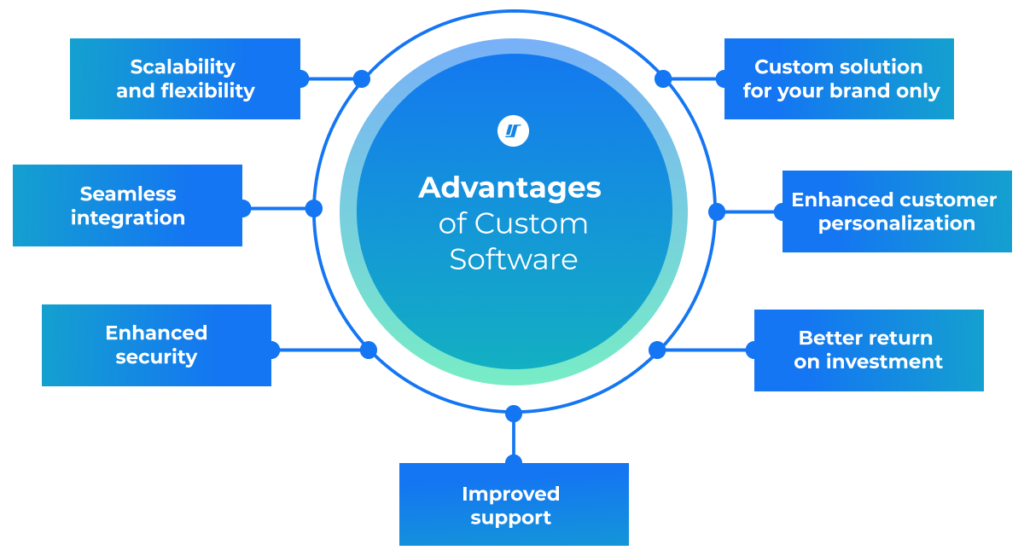CUSTOM SOFTWARE DEVELOPMENT
INTRODUCTION
Custom software development is the intricate process of creating tailored software solutions that precisely address the unique needs and challenges of a specific business or organization. Unlike off-the-shelf software, which offers a generic approach, custom software is meticulously designed to align seamlessly with your particular business objectives and workflows. Investing in custom software development is akin to embarking on a voyage of discovery, where the horizons are limitless. It serves as the key to unlocking a realm where software doesn’t just adapt to your business—it becomes an indispensable component, streamlining operations, automating complex tasks, and equipping your team with state-of-the-art tools. With custom software, you gain the ability to redefine industry standards, exceed customer expectations, and achieve unparalleled success.
In this comprehensive blog post, we explore the remarkable benefits of custom software development, shedding light on the methodologies that bring these solutions to life and the compelling reasons why it stands as the ultimate choice for businesses striving to maintain a competitive edge in our rapidly evolving digital landscape.

CUSTOM SOFTWARE DEVELOPMENT METHODOLOGIES
Custom software development methodologies encompass diverse approaches and frameworks used to structure and manage the software development process. Each methodology has unique characteristics, advantages, and disadvantages, making it suitable for different project types and organizational contexts.
1. Agile Methodology: Agile is an iterative and incremental approach that emphasizes collaboration, flexibility, and continuous improvement. It involves breaking down projects into smaller, manageable tasks or ‘sprints,’ with frequent feedback and adaptation to evolving requirements. Agile methodologies like Scrum and Kanban promote teamwork, transparency, and the rapid delivery of high-quality software.
2. Waterfall Methodology: Waterfall follows a sequential, linear progression with clearly defined phases such as requirements gathering, design, development, testing, and deployment, each completed before moving to the next. While suitable for projects with stable requirements and well-defined plans, incorporating changes can be challenging.
3. Iterative Methodology: Similar to Agile, the iterative methodology develops software in incremental stages. Unlike Agile’s shorter sprints, iterations may be longer and include complete cycles of development, testing, and feedback. Each iteration builds upon the previous one, allowing for progressive refinement and validation of the software. This methodology offers more flexibility than Waterfall but may require more upfront planning.
4. Rapid Application Development (RAD): RAD emphasizes speed and efficiency, using pre-built components, code generators, and visual programming tools to accelerate development. It is suitable for projects with tight deadlines or where rapid prototyping and user feedback are crucial.
5. Lean Methodology: Lean focuses on minimizing waste and maximizing value throughout the development lifecycle. It emphasizes continuous improvement, customer feedback, and the elimination of non-value-added activities, aiming to deliver high-quality software while reducing development time and costs.

WHY CHOOS CUSTOM SOFTWARE DEVELOPMENT?
Custom software development offers businesses a multitude of advantages, helping them achieve their distinct goals and objectives. Among its primary benefits is the ability to tailor solutions precisely to a business’s unique requirements and workflows. This customization facilitates streamlined operations, heightened efficiency, and a competitive edge. Custom software can automate repetitive tasks, seamlessly integrate with existing systems, and provide real-time data and analytics, empowering businesses to make informed decisions and swiftly adapt to evolving market dynamics.
Moreover, custom software excels at enhancing customer satisfaction. By understanding the specific needs and preferences of their clientele, businesses can develop software solutions that deliver personalized experiences and exemplary service. This fosters increased customer loyalty, boosts repeat business, and cultivates positive word-of-mouth referrals. Additionally, custom software can bolster employee productivity and job satisfaction by providing them with the necessary tools and resources to perform their tasks proficiently. Furthermore, custom software development ensures businesses retain complete ownership and control over their software assets. This autonomy allows them to implement modifications and enhancements as needed, eliminating dependence on third-party vendors or platforms. Such flexibility is crucial for businesses operating in rapidly evolving industries or with unique requirements unmet by off-the-shelf software solutions.
BENEFITS CUSTOM SOFTWARE DEVELOPMENT
• Tailored Solutions: Custom software development ensures that your software precisely meets your unique business needs, optimizing processes and enhancing user experiences.
• Competitive Edge: By crafting bespoke solutions, businesses can introduce innovative features that differentiate them from competitors, driving customer loyalty and profitability.
• Seamless Integration: Custom software seamlessly integrates with existing systems, eliminating the need for costly workarounds and ensuring smooth data flow across platforms.
• Enhanced Productivity: Custom solutions are designed to blend seamlessly with your business infrastructure, enhancing overall productivity and user experience.
• Agility: Custom software empowers businesses to adapt swiftly to changing market conditions, enabling effortless updates and modifications to stay ahead of trends and preferences.
• Security: Custom solutions prioritize security with robust encryption methods and access controls, minimizing the risk of data breaches and instilling user confidence.
• Reliability: Rigorous testing and quality assurance processes ensure that custom software operates seamlessly and reliably, minimizing the risk of bugs or system failures.
• Scalability: Custom software solutions can grow with your business, accommodating increasing demands and scaling to meet evolving needs without compromising performance.

CONCLUSION
Custom software development streamlines operations, enhance decision-making, and boosts efficiency by automating tasks, integrating systems seamlessly, and leveraging real-time data and analytics. This optimization drives productivity and resource allocation.
Moreover, personalized experiences and exceptional service elevate customer satisfaction, fostering loyalty and a competitive advantage. Equipping employees with the tools they need enhances productivity and job satisfaction, creating a positive work environment. Retaining ownership and control over software assets enables informed decision-making, data protection, and regulatory compliance. In a rapidly evolving digital landscape, custom software development is a strategic investment, enabling businesses to adapt swiftly and thrive. By embracing custom software solutions, organizations unlock their full potential, achieve their goals, and stay ahead in the digital age.
